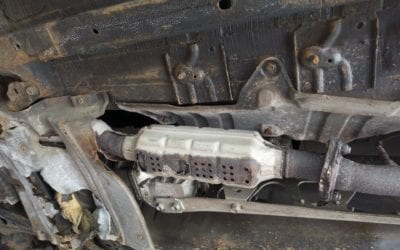Senate Mulling Over New Speed Limiter Mandate
The idea of a speed limiter for freight trucks is nothing new. Some fleets have been using them for years already. But a proposed speed limiter mandate from the DOT – first sidelined in 2016 – may be making a comeback.
If you follow trucking news at all the idea of a speed limiter – and the DOT’s speed limiter mandate – is old news. Back in September of 2016 the USDOT was looking at the possibility of implementing speed regulators in new commercial trucks. The proposal was met with both praise and criticism, and was ultimately shelved after Donald Trump was inaugurated. But a new Senate bill has brought the debate up once again.
Chances are the senate bill won’t pass, but it could wind up as part of a larger bill and still go through. So it’s important to know the issue and the pros and cons of it, as well as how this speed limiter mandate might impact car shipping services.
Article Overview
A quick overview of the speed limiter mandate
Basically, each new truck would be required, by law, to have a speed regulator installed. The regulator would set the maximum speed that a truck could travel, which is around 65mph.
Proponents of the proposed speed limiter say it will be safer and fuel economy will be improved and emissions cut. Opponents say that roads will be more unsafe due to more instances of “rolling roadblocks.” A rolling roadblock is where two trucks drive side-by-side on a highway, preventing other motorists from passing or even seeing beyond them.
There are multiple large fleets that have been using speed regulators since at least 2009, and the evidence seems to back speed limiters as a useful way to keep our roads safer. But the jury, apparently, is still out.
The pros of the speed limiter mandate
One major company, Schneider, has been using speed limiters since 2009. They have stated repeatedly that fuel economy has gone up and accidents have gone down since their implementation. And it makes sense. By capping speeds at 65mph, trucks are at less risk for speed-related accidents, and accidents that do occur have lower injury and fatality numbers than those that aren’t regulated.
This is backed up by a DOT study done in 2012. According to the article linked in the previous paragraph, “trucks without limiters had 16.4 crashes per 100 trucks versus 11 crashes per 100 trucks for trucks equipped with limiters. The report covered more than 150,000 trucks that had more than 28,000 crashes during 2007-09.””
The study also showed that speed-related accidents with speed limiters was just 1.4 crashes per 100 trucks per year. However, the rate for trucks not using a limiter was 5 crashes per 100 trucks per year – more than three times higher. The DOT also stated that a limit of 60mph would prevent up to 500 deaths per year, while a limit of 65mph would prevent roughly 200 deaths and a 68mph limit would prevent roughly 100 deaths. Also, setting the maximum speed to 60mph could save up to $6,000 per year on fuel alone. This does go down with higher speed limits, but still nets a saving of hundreds per year.
The cons of the speed limiter mandate
The main argument against speed limiters seems to be coming after the safety aspect. The main opponent is a group called OOIDA, the Owner-Operator Independent Drivers Association. Todd Spencer, OOIDA Executive Vice-President, has said that limiting speeds for trucks could have a detrimental impact on traffic, which could increase safety issues.
““Highways are safest when all vehicles travel at the same relative speed,” Spencer said, again from the article linked in the previous section. ““This wisdom has always been true and has not ever changed.”
The idea here is that traffic moving at the same relative speed will always be safer than traffic moving at different speeds. The main argument for this seems to come from testimony given in 2003 by the FMCSA’s Julie Anna Cirillo, who worked at the FMCSA for 34 years. She states that speed limiters could force some trucks off the interstate highways and onto more local highways, which could increase safety issues, as they try to bypass the speed limiters.
Another factor OOIDA points to is that the majority of crashes involving trucks seems to be from rear-end collisions from other motorists. If speed limiters are put in place, these types of crashes could increase.
How speed limiters could impact the auto shipping industry
It’s hard to tell how the speed limiter mandate – if it passes – would impact the auto transportation industry. However, chances are it would impact it the same as it would any other industry. Transit times may go up a bit, particularly on longer shipments. But on the whole it likely won’t do much at all.
You have to understand that there are already so many regulations on carriers that most cannot legally drive more than 400 miles per day. Speed limits are already enforced more heavily for trucks than motorists, especially on interstate highways. Drivers already have to deal with electronic logging devices, which has been a contentious subject for quite some time. Adding speed limiters could very well force some carriers off the road.
That being said, we don’t want unsafe carriers on the road anyway. If a carrier is having to drive 80 miles per hour on a highway with a 65mph speed limit, that’s a problem. And a speed limiter isn’t going to solve that problem.
But overall, speed limiters shouldn’t impact the auto shipping industry any more than any other industry. Commercial trucks have to follow the same rules regardless of what they’re hauling (hazardous materials not included).
Dave’s take on the issue
My opinion on this – should anyone want it – is that speed regulators are a necessary thing. But I can see the other side as well. There are many highways in the U.S. that have speed limits of 65mph or even higher. Some highways in Montana, for instance, allow motorists to travel 80mph. The same goes for California, and likely many other states.
Will the speed limiter require trucks to travel at 65mph even if the speed limit is 70 by law? If so, that makes little sense to me personally, and I can fully understand the con side in this argument. Forcing trucks to travel slower than the normal speed of traffic could result in more accidents, particularly at on and off ramps.
But for the vast majority of highways in the nation, 60mph is the standard, and having a regulated speed limit of 65mph for commercial trucks shouldn’t really affect them all that much. If a carrier is obeying the speed limits and the laws that they operate under, is it even necessary?
Right now we’re wondering if the bill will even pass, and as we mentioned it likely won’t. At least, not unless it’s stuffed into a different bill, like a transportation bill. But we’ll keep you appraised on what goes on and how it might impact your shipment moving forward.
- When to go with an Enclosed Transport - October 2, 2023
- Understanding California’s EV Mandate - August 1, 2023
- Top Reasons Auto Shippers Are Delayed - January 9, 2023



